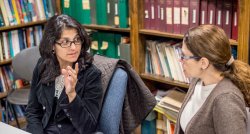Our faculty has elaborated our department mission in terms of specific objectives that fall into the following three categories:
- To provide a quality curriculum at the bachelor’s, master’s and doctoral levels that facilitates students’ development of:
- An understanding of the philosophical, historical, sociological, political, psychological and economic foundations of education.
- An understanding of the local, national and global contexts of education, including a focus on urban education.
- An understanding of schooling as a social, political and intellectual institution, with an eye to making schooling more democratic.
- An understanding of the methods, theoretical bases, purposes, possibilities, limitations and ethical dimensions of research and evaluation in education and related fields, and practical experience in applying this understanding.
- Creative thinking, as well as the ability and disposition to think critically and creatively.
- The ability and commitment to engage in a critical analysis of educational issues and the professional knowledge base of teachers, and to apply the results of that analysis to educational reconstruction.
- An attitude of care for and empathy with others and an awareness of and sense of responsibility for social problems.
- An understanding of the role of philosophy in the elementary and secondary curriculum, and in educational reconstruction.
- An understanding of childhood and youth from the perspectives of the disciplines other than education–e.g., history, philosophy, literature, art, anthropology, law–which promote reflection on educational theory and practice.
- To promote collaborative inquiry within the department, the College for Education and Engaged Learning, the University, the surrounding community and the global community, including:
- Ongoing inquiry into the educational implications of the search for an inclusive and just society.
- Forums through which schools and communities outside the university have access to departmental resources, e.g., faculty consulting, service learning activities, and student and faculty research.
- Analysis and critique of the practice of schooling from philosophical, historical, social, political, psychological and economic perspectives.
- Specific practices that instantiate the results of our inquiries, e.g., outreach programs, intra- and inter-department faculty collaborations, action research and team teaching.
- Analysis and critique of the extent to which educational systems and discourses promote critical and creative thinking.
- Analysis and critique of the role of technology in education from philosophical, historical, social, political, psychological and economic perspectives.
- To continually reconstruct department goals and functions by:
- Cultivating financial and other resources from the university and from external sources that will enable the department to fulfill its mission and goals.
- Seeking opportunities for professional growth in teaching, research, scholarship and service.
- Continually collecting information regarding social trends and movements in the foundations of education and reassessing the needs served by the department; and evaluating and reconstructing department goals, programs and procedures on an ongoing basis in light of that information.
- Further integrating technology into department programs, procedures and services.
- Continually assessing the relationship of our department programs to the goals of the college and university and to the programs of other departments.
- Providing avenues for student input into department goals, programs, procedures, offerings and services.
- Establishing a departmental environment for students, faculty and others that is safe, fair, open and inviting.
